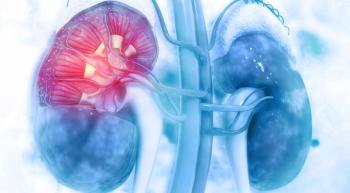
GU Nurse Talks Exciting Advancements in Bladder Cancer
Nurses must stay up to date with the fast-moving world of bladder cancer.
Treatment for bladder cancer has completely changed in recent years, and it is crucial that oncology nurses keep up with the latest advances to ensure the best possible patient care, explained Michael Lai, ARNP, an advanced registered nurse practitioner at the Seattle Cancer Care Alliance.
Lai, who is also a teaching associate at the University of Washington School of Medicine, discussed these updates at the
“For bladder cancer, the world of therapy in the metastatic setting has completely changed,” he said in an interview with Oncology Nursing News®. “There has been nothing in the last 10 to 15 years or so, and now in the last 5 years, there’s just an enormous breadth of research that’s being done and a lot of promising drug therapies are coming along. There’s still a lot of work to do, but we’re very excited.”
Enfortumumab Vedotin
One exciting agent that is being explored is enfotumumab vedotin, Lai explained. The antibody drug conjugate is being analyzed as a monotherapy for locally advanced or metastatic urothelial carcinoma that was previously treated with platinum and immune checkpoint inhibitors.
Results of the single-arm, pivotal phase II trial of the drug were presented this year at the
They showed that enfortumumab vedotin was the first novel therapy to spark substantial clinical activity in this patient population, with a 44% response rate, 12% complete response rate, and 7.6-month median duration of response.
Pembrolizumab
Also presented at the ASCO Annual meeting by Matthew Galsky, MD, from Mount Sinai, was a trial comparing the checkpoint inhibitor pembrolizumab (Keytruda) to placebo in patients with metastatic urothelial carcinoma who had stable disease after first-line chemotherapy.2
Patients (n = 200) were randomized to wither 200 mg of intravenous pembrolizumab or a placebo. Those who were given a placebo could cross over to the checkpoint inhibitor arm if they experienced disease progression.
The objective response rate for the pembrolizumab arm was 22%, compared to 12% on the placebo arm. Additionally, patients on the immunotherapy agent had significantly longer average progression-free survival, too.
“There’s a lot more interest in bladder cancer these days. It’s a deadly disease when it’s metastatic so we’re trying to find options that go beyond the first- and the second-line that can prove to have some survival benefit,” Lai said.
Adverse Events: The “Canary in the Coal Mine”
As new therapies — particularly immunotherapy agents – continue to be widely used in the bladder cancer space, it is crucial for oncology nurses to know about immune-related adverse events (irAEs) to be aware of.
“[We should] be asking questions and checking in on things that otherwise seem benign,” Lai said. “In immunotherapy, these things can be the so-called canary in the coal mines.”
For example, Lai mentioned that a patient’s cough could be just that — a minor cough. But it can also be a sign of pneumonitis, which is a major irAE that must be dealt with quickly. Similarly, any gastrointestinal issues must be reported and handled in a timely manner, before they turn into a “full-blown autoimmune reaction and toxicity,” Lai said.
“These are important things that we need to gather and that we need to make sure we’re keeping an eye on from day to day,” Lai said.
References
- Petrylak DP, Balar AV, O’Donnell PH, et. al. EV-201: Results of enfotumumab vedotin monotherapy for locally advanced or metastatic urothelial cancer previously treated with platinum and immune checkpoint inhibitors. Presented at: ASCO Annual Meeting; May 31-June 4, 2019; Chicago, IL.
- Galsky MD, Pal SK, Mortazavi A, et. al. Randomized double-blind phase II study of maintenance pembrolizumab versus placebo after first-line chemotherapy in patients with metastatic urothelial cancer: HCRN GU14-18 Presented at: ASCO Annual Meeting; May 31-June 4, 2019; Chicago, IL.
Newsletter
Knowledge is power. Don’t miss the most recent breakthroughs in cancer care.






































